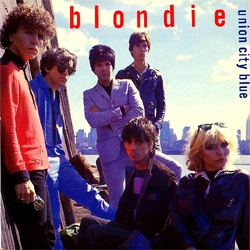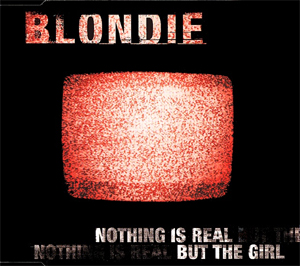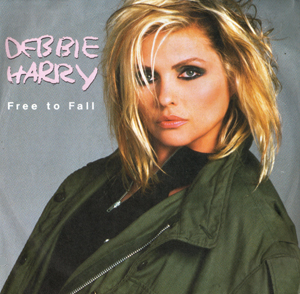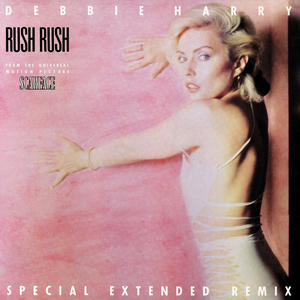
Blondie is an American rock band formed in 1974 in New York City by singer Debbie Harry and guitarist Chris Stein. The band was a pioneer in the American new wave scene of the mid-1970s in New York City.
John Benitez, also known as Jellybean, is an American musician, songwriter, DJ, remixer, and music producer. He has produced and remixed artists such as Madonna, Whitney Houston, Michael Jackson, and the Pointer Sisters. He was later the executive producer of Studio 54 Radio. In December 2016, Billboard magazine ranked him as the 99th most successful dance artist of all-time.

"Call Me" is a song by the American new wave band Blondie and the theme to the 1980 film American Gigolo. Produced and composed by Italian musician Giorgio Moroder, with lyrics by Blondie singer Debbie Harry, the song appeared in the film and was released in the United States in early 1980 as a single. "Call Me" was No. 1 for six consecutive weeks on the Billboard Hot 100, where it became the band's biggest single and second No. 1. It also hit No. 1 in the UK and Canada, where it became their fourth and second chart-topper, respectively. In the year-end chart of 1980, it was Billboard's No. 1 single and RPM magazine's No. 3 in Canada.

"One Way or Another" is a song by American new wave band Blondie from their 1978 album Parallel Lines. Lyrically, the song was inspired by Blondie frontwoman Deborah Harry's experience with a stalker in the early 1970s, an incident which forced her to move away from New Jersey. The song's music was composed by bassist Nigel Harrison, who introduced the Ventures-influenced track to keyboardist Jimmy Destri.

"Heart of Glass" is a song by the American new wave band Blondie, written by singer Debbie Harry and guitarist Chris Stein. It was featured on the band's third studio album, Parallel Lines (1978), and was released as the album's third single in January 1979 and reached number one on the charts in several countries, including the United States and the United Kingdom.

"Union City Blue" is a song by the American new wave band Blondie. The song was featured on their 1979 studio album Eat to the Beat. Written by Debbie Harry and Nigel Harrison, the song was inspired lyrically by Harry's experiences while acting in the 1980 film Union City as well as her New Jersey roots. Musically, the song features a drum part composed by drummer Clem Burke.

"Rapture" is a song by American rock band Blondie from their fifth studio album Autoamerican (1980). Written by band members Debbie Harry and Chris Stein, and produced by Mike Chapman, the song was released as the second and final single from Autoamerican on January 12, 1981, by Chrysalis Records. Musically, "Rapture" is a combination of new wave, disco and hip hop with a rap section forming an extended coda.

"Nothing Is Real but the Girl" is a song by American rock band Blondie. Written by the band's keyboardist Jimmy Destri, it was the second single released from their seventh album, No Exit (1999), on May 31, 1999. The single peaked at number 26 in the United Kingdom and number 89 in Germany.

Rockbird is the second solo studio album by American singer Debbie Harry. It was released in November 1986 by Geffen Records in the United States and Chrysalis Records in the United Kingdom.

"In Love with Love" is a 1987 song recorded by the American singer Debbie Harry. It was taken from her second solo album Rockbird and released as the third single in 1987.

"Free to Fall" is a song by American singer Debbie Harry from her second solo studio album, Rockbird (1986). It was released as the second single in the United States and the United Kingdom. Suffering from lack of record company promotion, the single failed to chart on the Billboard Hot 100 or any other significant U.S. chart, and peaked at number 46 on the UK Singles Chart. The B-side to the single, "Feel the Spin", was a previous U.S. dance hit from the soundtrack to the film Krush Groove.

"Backfired" is the debut solo single from American singer and Blondie vocalist Debbie Harry. Released in 1981, it was taken from her debut solo studio album, KooKoo.

"Dreaming" is a song by American new wave band Blondie. Released in 1979, the song was the opening track from their fourth album Eat to the Beat. Written by guitarist Chris Stein and singer Debbie Harry and partially inspired by ABBA's "Dancing Queen," the song also features an active drum performance by drummer Clem Burke, who did not expect the final recording to feature his busy drum track.

"Gambler" is a song by American singer Madonna from the soundtrack album to the 1985 film Vision Quest. The song was written solely by Madonna, while the production was handled by John "Jellybean" Benitez at her request. It was released as the second single from the film's soundtrack album on October 3, 1985, by Geffen Records. "Gambler" was never released as a single in the United States, at the request of Madonna's own Sire Records. The music video of the song is an excerpt from the film.

Once More into the Bleach is a remix album released in December 1988 by the band Blondie and Debbie Harry. The 13-track compilation contains remixes of Blondie songs and material from Harry's solo career. It was the first compilation to include non-album singles "Rush Rush" and "Feel the Spin".

"I Can See Clearly" is a song by American singer Debbie Harry, released in June 1993 as the first single from her fourth solo album, Debravation (1993).

"Rush Rush" is a song written by Giorgio Moroder and performed by American singer Debbie Harry. It was released as the fourth and final single from the soundtrack to the 1983 film Scarface.

Most of All: The Best of Deborah Harry is a compilation album of recordings by Deborah Harry, released by Chrysalis Records in 1999.

Deborah Ann Harry is an American singer, songwriter and actress, best known as the lead vocalist of the band Blondie. Four of her songs with the band reached No. 1 on the US charts between 1979 and 1981.

"French Kissin" is a song by American singer Debbie Harry from her second solo studio album, Rockbird (1986). It is a cover version of the 1985 song originally recorded by Carol Chapman, written by Chuck Lorre before he started creating sitcoms. Harry's version was released on November 3, 1986, as the lead single from Rockbird and became a top-10 hit in Australia, Ireland, New Zealand, South Africa, and the United Kingdom.



















